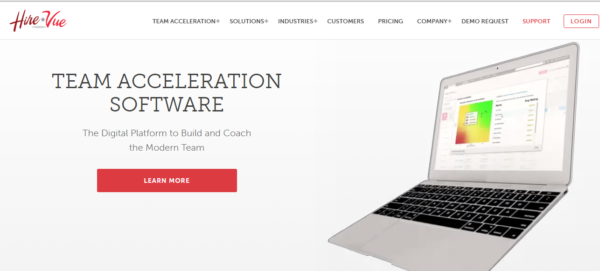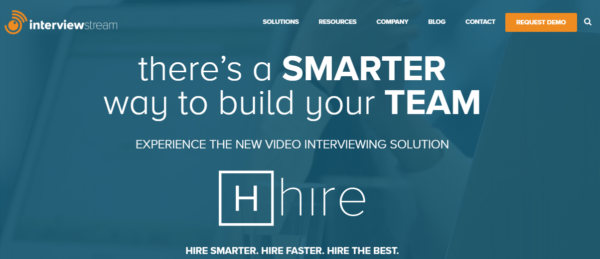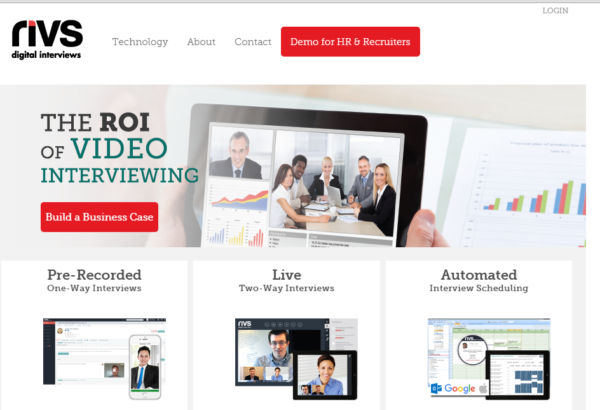Is Video Interviewing a Realistic Answer to a Flawed Process?
August 27, 2016
Let’s be honest: Who really likes the interview process? We can safely say the candidate probably hates it. But you probably do, too. For the candidate, it’s stressful and nerve-wracking. For you, it’s time-consuming and oftentimes overly subjective. And unfortunately, you’re probably all too familiar with a time that you hired someone who aced the interview and turned out to be a bad fit.
Yet there’s no doubt that the interview is the linchpin of the hiring process. Despite its flaws, it’s necessary. It’s not going away any time soon. But can video technology transform it?
Recognizing Potential Flaws in the Process
Assuming you find the perfect candidate, the time you spend in the interviewing process will yield significant return. But we’d be a fool to admit there isn’t room for improvement. The truth is that the interview process is a huge time suck. Depending how many people you interview for a position and how many interviews you conduct per person, the hours spent scheduling, organizing, actually interviewing, and then reviewing those interviews exponentially adds up. That’s time away from other key recruitment activities, like networking, sourcing, and negotiating job offers.
The other potential flaw in the interviewing process is a biggie. It’s the fact that it runs the risk of being inconsistent and highly subjective, which can significantly impact the accuracy of your candidate evaluation. Even if you set up your ATS to guide recruiters through the interview process, it’s not uncommon to verge outside of the required set of questions, and we all know that notetaking can vary wildly from one recruiter to the next. This potential for inconsistency is, in our experience, one of the main causes for later falloffs and premature terminations.
What About Video Interviewing?
The history of the staffing history is a lesson in transformation. From newspaper ads and file folders to dynamic ATS solutions and social recruitment tools, digitalization has been the catalyst for major growth. Is video interviewing the next step in this natural progression? Perhaps.
- More Candidates, Less Time
Successful recruiting teams have a consistent rhythm to their days: search, scan and screen. Searching and scanning can be performed without candidate interaction. Recruiters are able to accomplish these tasks at their own pace, depending on their workload and goals for that particular day.
But screening involves both the recruiter and candidate, requiring a conversation, a touch point or, at the very least, an email response from the applicant. This can quickly become the most time-consuming part of a recruiter’s day.
While a simple phone screen may only last 15 minutes, multiple comprehensive interviews could total several hours. Phone screen time doesn’t account for the time lost in coordinating recruiter and candidate schedules. It also does not include the amount of time a recruiter will spend preparing for the interview or debriefing once the interview concludes.
What if your recruiters could watch interviews at their leisure? What if setting up an interview were as simple as sending an email to the candidate with a time-sensitive link? Video interviewing allows for these capabilities, maximizing the number of candidates that can be screened/interviewed over any given time period.
- More Time Asking Questions and Observing; Less Time Taking Notes
Have you ever ended an interview only to realize you forgot to ask a key question? What about an important bit of information that you failed to jot down? Details lost in translation can lead to a fragmented outcome when you want to judge all candidates by the same metrics.
It’s very easy for recruiters to miss key elements during an interview. This is particularly true when it comes to body language cues, like eye contact, hand gestures, and facial expressions, all because they’re too busy scratching down pivotal notes.
Video interviewing gives you the opportunity to sit and analyze what candidates say as well as pick up on various body language cues. Because you’re able to rewind and re-watch any given interview (either in whole or by fast-forwarding to certain points), the fear of missing key information dissipates dramatically. Video interviewing grants you the freedom to truly listen to a candidate answer crucial questions without the distraction of keeping perfect notes along the way.
- More Accurate Candidate Comparisons
A streamlined interview process via video interviewing naturally leads to greater consistency. It means recruiters aren’t relying on memory or hasty notes to compare candidates, but can instead more accurately assess each candidate in relation to the client’s requirements. Recording features also allow multiple members of the recruiting team to collaborate using the same data points, enabling more effective decision-making.
It also means that each candidate receives the same interview experience. Where in the past, their interview performance might have depended on how well they connected with their assigned recruiter, this process creates a more objective interaction.
So, Is Video Interviewing a Realistic Answer to a Flawed Process?
The traditional interviewing process exists for a reason: It’s necessary and, for the most part, it works. But there’s no denying the process has room for improvement in both efficiency and effectiveness.
Video interviewing leverages user-friendly technology to help avoid biases and subjectivity, reduce the stress of scheduling, and significantly increase consistency and collaboration. Convenience, flexibility, and accuracy are huge factors in making the business case for video interviewing. It certainly appears to be a powerful solution to a frequently flawed process.
Maybe video interviewing is right for you, maybe it’s not. Either way, it’s certainly worth considering how tools like this impact your processes – and your brand. We’re all too familiar with the challenges staffing firm have in marketing themselves to qualified candidates and reputable prospects.
Wondering Where to Start? Here Are Some Suggestions.
Video interviewing changes how you interact with your candidates. So does your branding.
Business & Finance Articles on Business 2 Community
(51)








